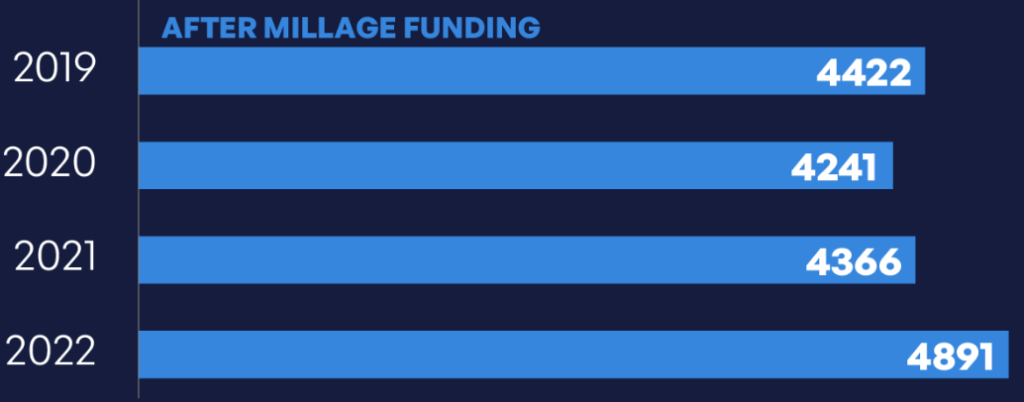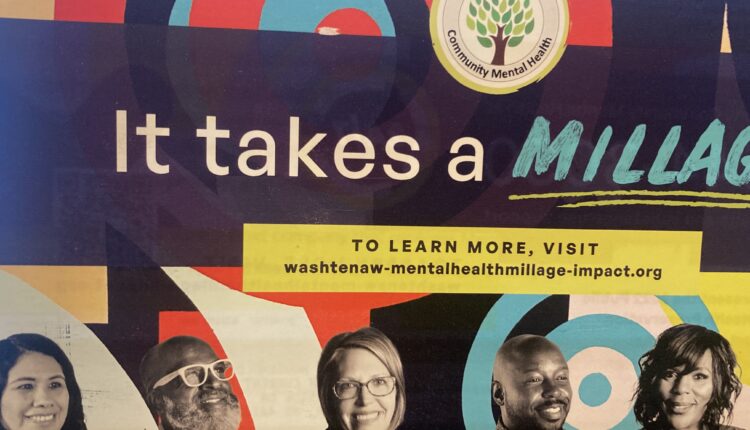Postcard Paid for With Mental Health Millage Money Claims “Dramatic” Increases in Services
by P.D. Lesko
“This mental health system finally broke me…abandoned by whomever was supposed to be helping me every step of the way. Drs Madjar and Bright seemed to care but every other person or ‘team’ let me drop through the cracks; now I’ll be on the street,alone at 64 to try and survive.” August 2023, Heidi Buffalino, former CMH client, Washtenaw County resident.
“They misdiagnosed me and force[d] me to take meds.” — Anonymous former CMH client, August 2023
In June 2023, The Ann Arbor Independent published “Residents Refused Mental Health Services While CMH Spends Millage Money On Consultants, PR And Paid ‘News’ Coverage.” Public records obtained by the newspaper show that shortly after the article was published, Trish Cortes, who is the Director of Washtenaw County Community Mental Health, spent upwards of $100,000 of Mental Health and Public Safety millage money for a PR postcard.
The postcard was designed and prepared by the same CMH consultant that, since 2021, has been the beneficiary of no bid contracts for public relations and media work costing upwards of half a million dollars. The no bid contracts were executed between Washtenaw County and the Center for Health Research Transformation (CHRT) at the University of Michigan. Cortes is paying the consultants with Mental Health Millage money. CHRT’s Exec. Dir. Terrisca Des Jardins is paid $251,866 by U-M and is currently collecting an hourly rate of $260 paid for by the County’s Mental Health Millage. According to IRS tax returns, CHRT’s work is co-sponsored by Michigan Medicine and the St. Joseph Mercy Health System.
The consulting firm is housed at the University of Michigan. Public records show the CHRT consultants are paid with Mental Health Millage funds at rates of between $80-$260 per hour (annual salaries of $166,000-$540,800).
The postcard titled “It Takes a Millage,” presents “the 2022 Public Safety and Mental Health Preservation Millage impact report.” Among the report’s purported accomplishments is the claim that in 2022 CMH saw “dramatic increases in behavioral health services for all ages.”
The newspaper used the Freedom of Information Act to determine how many postcards were sent out and who in the County was targeted. The County refused to provide that information. It appears, however, voters in Ann Arbor were targeted. The millage renewal vote will take place in 2026.
“Dramatic” Increase in Services?
The graph, below, from the 2022 Public Safety and Mental Health Preservation Millage impact report shows the number of individuals receiving services annually from the CMH CARES Team since the millage money was first collected and distributed to CMH. In 2018, 29 CMH CARES Team employees provided CARES services to 2344 individuals. While there was an initial jump in 2019 in the number of CARES clients, after receiving approximately $20-$24 million in millage money since 2019, CMH has increased services by 469 individuals, or 9.5 percent overall since Mental Health Millage money began to be dispersed to CMH.

County records show that Since 2018, the number of staff working on the CARES Team has doubled.
The 60 members of the CMH CARES Team still includes a Program Administrator who earns $93,047, down from $103,223, in 2018. Added have been four Access Supervisors I/II who each earn $73,091.98, and five Client Service Managers who earn between $56,811 and $43,713 annually. There is now a Health Service Supervisor II who earns $71,453.
Between 2018 and 2022, the number of Crisis Services Professionals increased from eight to 17 and the number of Mental Health Professionals on the CARES Team went up from four to 18.
The postcard goes on to highlight “Critical new services offered by community partners” and “new commitments to schools, housing agencies, and more.”
Washtenaw County schools already take in upwards of $500 million from taxpayers annually. The Ann Arbor Public Schools Mental Health and Crisis Services information page on the District’s website points students and families to the Washtenaw Health Plan (WHP).
According to that webpage, “WHP staff are here to help. Call for a health care coverage checkup, ask a question, apply for Medicaid or Marketplace insurance or just chat about healthcare options. We have answers – We Help People!” The County offers residents the Washtenaw Health Plan B. It is not health insurance.
WHP is a health coverage program for low-income Washtenaw County residents who don’t have access to affordable health insurance. Few county residents qualify and few are enrolled. According to the WHP webpage: “WHP helps people get the health care services they need. WHP is NOT insurance. Enrollment is only for low-income individuals who are not eligible for any other health coverage.” Ironically, the WHP covers only “limited mental health services.”
Enrollment in the WHP is presently open.
Paid News Coverage For CMH
On Aug. 9 Second Wave Media, a privately-held company that receives Mental Health Millage money for paid news coverage, published “New report shows impacts of Washtenaw County’s mental health millage in 2022.”
Lisa Gentz is the WCCMH program administrator. She told Second Wave Media: “What we’re trying to do with the millage funds is trying to make sure that people have early access to treatments and [are] able to easily navigate the mental health system so that they can get connected at the right time to the right services that they need.”
According to Community Mental Health, the millage investments also benefit community agencies across the county, including Avalon Housing, the Corner Health Center, and the National Alliance on Mental Illness – Washtenaw County, enabling them to expand their programs and support more people in need.


Comments are closed, but trackbacks and pingbacks are open.